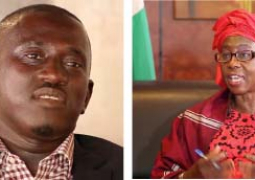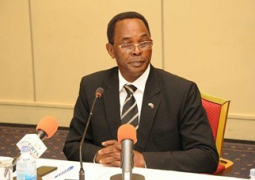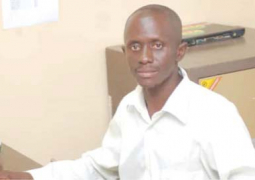With The New Gambia now turned against the party in power, libel charges followed one after the other. A huge passport scandal hit the headlines in the paper in 1968 when a diplomat serving The Gambia abroad was found trafficking in Gambian travel-documents. It blew up into a big story when criminals caught in many parts of Africa, especially in areas mining diamonds and other precious metals in Angola, the Congo and Sierra Leone were caught carrying Gambian passports. Even though there was ample evidence to show that the foreign services officer was culpable, the government chose impunity and, instead, charged and tried the editor; but sitting magistrate Edmund Njie, acquitted him. Swaebou Conateh in his Comparative Study of Laws and Court Cases Concerned with Freedom of Expression and Media Ownership and Access in Colonial and Post-Independence Gambia 1945-1985, cites a case in 1968 when Violet Rumgay, the manageress of the Atlantic Hotel in Bathurst, sued the paper charging defamatory and libellous accusations in an article on workers’ gripes at the hotel. The magistrate acquitted him on nine counts but fined him a £100 on one count. According to Tarawally,no one to this day ever asked him to pay up even though he would appear again between 1967 and 1971 twice for libel in cases discontinued or were unsuccessful and twice more for contempt, both also unsuccessful.
Litigation would not stop Tarawally’s political muckraking. Stubborn persistence was his formula. What he described as his ‘make or break’ reporting principle went beyond just scratching the surface when there was a case to investigate and report on. Some people got away with murder simply because a case would be mentioned once in the papers and everyone would soon forgot about it. But not with The New Gambia, the editor said. The paper drove an issue as long as it took to get redress.
However, in 1971, Tarawally’s luck ran out. He was charged with 21 counts of seditious and criminal libel against the head of state in what became a landmark case: Inspector General vs. Baba Musa Tarawally, 1971.In this case Tarawally had alleged that there were electioneering malpractices going on, and acclaimed to have unearthed gross political and social irregularities in which the head of state was using forced labour in rice fields he owned in Jokadu. As news of the case unfolded week after week, and nine successive editions of the paper sold out in a few hours under the persistent headline My visit to Jokadu. The government was under tremendous pressure to react to what it initially rebuffed as ‘a baseless scandal.’ A warrant was issued and the editor was arrested and charged with seven counts of seditious libel against the head of state. Interview with Baba Musa Tarawally, November 2000. The editor was convinced that the government had to actually rummage for anything it could find to build a case against him. He said the charges included issues on which the newssheet had reported under completely different circumstances some eight months before and that the articles on the use of forced labour on the farms belonging to the head of state had no bearing on the series ‘My Visit to Jokadu.’
Tarawally posited that even comments on business transactions by the president or his cabinet ministers were concocted as offences against the state and the people of The Gambia and included in the charges The story alleging unpaid and forced labour on the president’s rice fields at Barajally in Niani district had appeared as early as eight months before the charges of criminal libel were proffered. The editor was convicted on that particular charge even in the face of overwhelming evidence that supported the information initially supplied to the editor by three crucial sources including close relatives of the president’s and a respected village alkalo (headman) but whose source the editor insisted on protecting out of journalistic ethics.
Tarawally pondered on the implications for the independence of the judiciary in The Gambia, when, while the same head of state filed criminal libel charges against The New Gambia only filed for civil action against another in London for the same purported offence. His only conclusion was that the law in England would never tolerate the kind of compromise and manipulation to which the Gambian judiciary was capable of subjecting the law here.
Tarawally’s lawyer, Solomon F. Njie, asked for time to prepare a case, but was refused. The defence counsel withdrew from the case in protest, complaining of the travesty of justice in the government’s speed to arraign the suspect, allowing no time for counsel to even talk to witnesses or prepare a proper brief. Without the benefit of a defence counsel, Tarawally appeared before the magistrate to speak in his own defence. He was remanded in custody until a one-day trial in May 1971 when he was found guilty of criminal libel against the State and, in an overcrowded courtroom, was sentenced to 27 months in prison.
While serving his sentence he prepared an appeal before the Supreme Court of The Gambia where his conviction was upheld but the sentence reduced to 13 months. Still not satisfied with the outcome, Tarawally took his case to the West African Court of Appeal (WACA), which sat to hear its annual docket of appeals cases. Justices Livesey Luke, Dove Edwin and Marcus Jones, agreed with the defendant’s argument that the trial judge had erred in law in refusing to provide reasonable time for the accused to prepare his defence. The judges of appeal reduced the sentence to ‘time served’, satisfied that the principal matter of contention, the purported defamation of the president, the government and a cabinet minister, were not actionable at face value. The onus was on the plaintiffs to prove their contentions. Tarawally walked free.
Despite the time spent behind bars (May 1971 to May 1972), Tarawally considered his release a victory, a vindication of his name, and a clear indication of the continued enslavement of the Gambian judiciary to the executive powers of President Jawara. A free man again, Tarawally hit the street with his newssheet, this time with a sense of heroism spurring him. The country was in the grip of election fever, presidential and parliamentary. The paper’s opening parries urged all 19 candidates in the 1972 General Election to stand against the PPP. It was destined to be the paper’s last outing. A banning order came crashing down immediately, and the editor was left without his only means of survival. The press was devastated by the government’s action against free speech and press freedom. With his liberty under siege and fears mounting for his own personal safety against desperate party thugs, and with virtual penury at his doorstep, Tarawally left The Gambia in search of a safe haven with a brother of his in Guinea Bissau.
Six years had passed when in 1978, after much political dust had settled and Jawara had become the undisputable leader fully in charge of affairs in a republican Gambia, Tarawally ended his self-imposed exile and returned home. With his fingers still itching for journalism, he set up a publication called Kibaro, published in his native Mandinka language. He also became the administrator of the National Adult Literacy Campaign (NALC) where he produced a Mandinka-English dictionary considered a great contribution to the standardisation of local language orthography. He also worked with the BBC while inserting snippets of journalistic writing now and again in a once-rival newspaper, the Gambia Onward.
Tarawally’s yearnings to return to full time journalism were to be fulfilled at last when Kukoi Samba Sanyang attempted to seize the reins of power on July 31, 1981. After President Jawara regained the State House four days later on August 4, 1981 party headquarters desperately needed to reach out to thousands of demoralised party militants and the nation at large to seal the loopholes of the past and set new standards. Plans were immediately set afoot to spruce up The Gambia Times.
After a 15-years estrangement, Tarawally attended an editorial board meeting to which he was invited at State House and sat at a table presided over by the president. The two men reconciled and in welcoming the editor back Jawara told him how badly he was needed at the Times. Tarawally, all too ready to put his energies back into journalism, accepted the post of editor. He brought on another brilliant reporter Jay Saidy into an editorial team that later recruited I. A. S. Burang John, the editor of the United Party Newsletter, who had defected to the PPP back in 1970. Thus, Tarawally was back at PPP headquarters bending over hard copy and urging a staff of writers on deadlines.
Although the ideologues inside the party contributed ideas and articles, Tarawally and Jay Saidy wrote most of the columns. They published party-tailored, yet scholarly, contributions from brilliant resources such as Hassan B. Jallow who was attorney general at the time, from Dr.Jabez Ayo Langley, then permanent secretary at the Economic Planning Ministry and, later, secretary general and head of the civil service, and from others within. Tarawally would become an invaluable institutional memory bank in 1992 in a team of editors that put together the story of the party in a book, The Voice of the People: The Story of the PPP – 1959-1989.He is listed in the credits as among those who read and made valuable comments on historical facts.
The passing of a man of such stature in journalism is a huge loss to the fraternity, yet remains he a lasting symbol that proves the dire need of resurgence among press giants who will neither dissemble nor cloke their confession of faith in democratic principles and the relentless pursuit of justice and truth.




